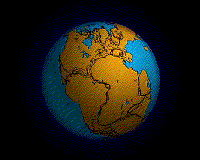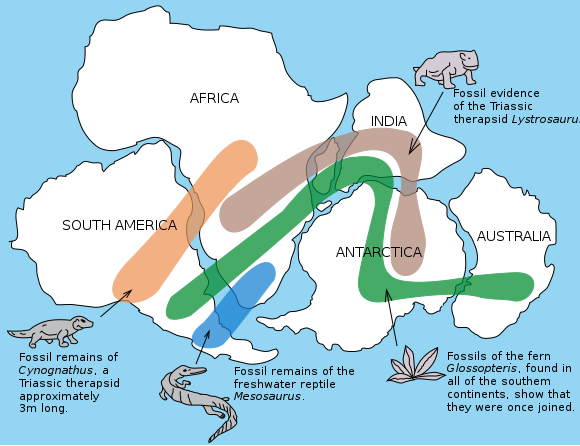Quiz
Here's a quiz for you of the video. Comment down below to answer! Be the first one to answer!
- When was the first sight of New Zealand?
- Is the supercontinent Arctica relate to Antarctica or the Arctic?
- What supercontinent was when it was -2018 Myr?
- Was Eon, Era and Period were it at the present day (today)?
- How long was Pangaea for?
- Where was the most land in the supercontinent Gondwana?
- Which country went from Antarctica to Asia, that made the Himalayas?
- Was Australia connected to Antartica?
- Where was North America when Pangaea ended?
- How long did South America and Africa attached together?

Pangaea
 |
| Fossil patterns across Gondwanaland |
 |
| Alfred Wegener |
Around 300 million years ago, Earth hadn't had the seven continents that we have now, but instead, there was one massive supercontinent, Pangaea. Pangaea was the most recent supercontinent. Alfred Wegener convinced that Earth's continents were once part of a supercontinent, Pangaea. Alfred trained as an astronomer, used botany, biology and geology to explain Pangaea and the continental drift. One example is fossils of the ancient reptile mesosaurus that are only found in South America and southern Africa. Mesosaurus is a reptile that is freshwater and it is just only one metre long, the reptile couldn't have swum the Atlantic Ocean.
Below is a video from Khan Academy showing Pangaea's idea and some evidence about it. Next, we are going to look at the first supercontinent.
The First Supercontinent
The first known supercontinent is Vaalbara. There is evidence of the first cratons in South Africa and Western Australia. The crust from Vaalbara is back 2.7 to 3.6 billion years ago.
Vaalbara's name comes from two cratons which were believed to be combined about 3.1 billion years ago. The first craton which now is in South Africa named Kaapvaal Craton. The second craton is the Pilbara craton which is in Pilbara, West Australia. Approximately 2.5 billion years ago the supercontinent split apart from each other. Their drift routes present additional evidence that they were once connected.
What I've Learnt
- About the fossil patterns that were across South America, Africa, India, Antarctica and Australia.
- Alfred Wegener had the first theory about the continental drift.
- Alfred Wegener tranined as an astronomer.
- Mesosaurus was a reptile that was only found in South America and southern Africa.
- Mesosaurus is only one metre long.
- The first cratons are in South Africa and Western Australia.
- The crust from Vaalbara is back 2.7 to 3.6 billion years ago.
- Vaalbara's name comes from two cratons.
- South Africa's craton name is Kaapval Craton.
- Western Australia's craton name is Pilbara Craton.
- Around 2.5 billion years ago the supercontinent split apart.